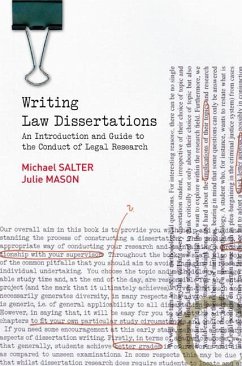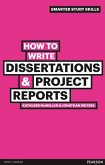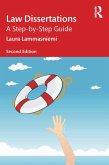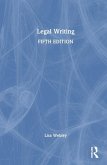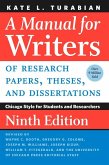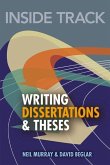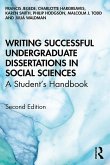Backcover
Features and Benefits
TOC
Features + Benefits
Shows how to avoid common stylistic and substantive pitfalls
Discusses the pros and cons of adopting law and policy methods
Addresses the issues around conducting research, including approaches such as black letter, socio-legal, interpretive and experimental
A running example throughout the text illustrates the various points made in each section and provides continuity
Backcover
'This is a book that is long overdue, and I am certain will be seized upon by tutors everywhere. It will serve students writing dissertations, and I might add, extended essays, very well indeed, combining pragmatic guidance on engaging in and managing research with the help of supervisors, with advice on the importance of methodological rigour.' Peter Billings – UWE
'I would love my dissertation and project students to have a copy'
Charlotte Smith – University of Reading
"This is an excellent book, full of practical guidance to help students cope with their first major piece of independent research" Catherine Elliott - City University
How should you choose your dissertation topic? What is the best research method to adopt? What is going to make your dissertation achieve the best grades?
Whether you are an undergraduate or postgraduate law student, working on a dissertation for the first time is an exciting yet often daunting experience. Writing Law Dissertations provides a clear, helpful and honest guide to every stage of the research and writing process specifically for law students, and answers the many questions that face first-time researchers. This essential reference book is uniquely based on the experiences of real law students, and draws on the authors’ extensive knowledge to help you to enjoy and succeed in your legal research project.
The book gives comprehensive guidance on:
Choosing a topic and getting started
Working effectively with your supervisor
Time management
Adopting appropriate research methods
Understanding theoretical approaches: black-letter, feminist, sociolegal, historical and interpretive.
About the authors
Michael Salter is Professor of Law at the Universityof Central Lancashire. He has teaching experience in degree level courses in property law, equity and trusts, land law, human rights law and research methods. He is also Postgraduate Coordinator.
Julie Mason is a Senior Lecturer in Law at the Universityof Central Lancashire, with teaching interests in the areas of family law, sentencing and the treatment of offenders, criminology and lawyer's skills.
CONTENTS
Introduction
Chapter 1. How to Begin
- Introduction
- What is 'research'?
- What is a 'dissertation'?
- How to choose your dissertation topic
- Specific suggestions for getting you started
- Identifying the key issues and marginal issues in your dissertation
- Is the research viable in practice?
- Putting pen to paper
- Conclusion
Chapter 2. Getting Along With Your Supervisor
- Introduction
- Choosing your supervisor
- When to choose
- What can you expect from your supervisor?
- The role of the dissertation supervisor
- Devise your own 'learning contract'
- At the beginning of your supervision
- Writing the dissertation
- Meeting your supervisor
- Reviewing draft chapters
- How much supervision?
- Making the most of constructive criticism and formative feedback
- Common problems with supervision
- Conclusion
Chapter 3. Selecting Suitable Approaches to the Conduct of Dissertation Research
- Introduction
- Resistance to methodological discussion
- Positive reasons for engaging in methodological discussion
- Recognising the implications of the tension between different research methodologies
- Avoiding the pitfalls of selecting an inappropriate methodology
- Conclusion
Chapter 4. Black-Letter Approaches to Doctrinal Research
- Introduction
- Towards a provisional working definition: black-letter law as legal formalism
- Other features of the black-letter approach
- The centrality of classic textbooks
- Insulating the dissertation topic from external factors
- Setting and answering the question: what is the legal position on X?
- The requirement to reveal a system of underlying principles ordering legal rules
- Searching for coherence and systematic order
- Legal principles and rules are largely determinate
- The standpoint of black-letter analysis
- Wider strategies of selective exclusion
- The focus on law in books
- Deductive methods of reasoning from first principles
- Law as a distinct and unique discipline
- The restricted character of black-letter forms of criticism of law
- Questions of evaluation: the advantages and problems of black-letter analysis
- Conclusion
Chapter 5. Sociolegal Approaches to the Conduct of Dissertation Research
- Introduction
- Defining sociolegal studies
- The diversity of topics and themes addressed by sociolegal studies
- The emphasis on law in action
- Policy and the power of ideologies
- The diversity of research methods used in sociolegal studies
- Ethical and other normative dimensions
- Strengths and criticisms of sociolegal approaches
- Conclusion
<
How should you choose your dissertation topic? What is the best research method to adopt? What is going to make your dissertation achieve the best grades? This book provides a guide to various stages of the research and writing process for law students, and answers the many questions that face first-time researchers.
Hinweis: Dieser Artikel kann nur an eine deutsche Lieferadresse ausgeliefert werden.
Features and Benefits
TOC
Features + Benefits
Shows how to avoid common stylistic and substantive pitfalls
Discusses the pros and cons of adopting law and policy methods
Addresses the issues around conducting research, including approaches such as black letter, socio-legal, interpretive and experimental
A running example throughout the text illustrates the various points made in each section and provides continuity
Backcover
'This is a book that is long overdue, and I am certain will be seized upon by tutors everywhere. It will serve students writing dissertations, and I might add, extended essays, very well indeed, combining pragmatic guidance on engaging in and managing research with the help of supervisors, with advice on the importance of methodological rigour.' Peter Billings – UWE
'I would love my dissertation and project students to have a copy'
Charlotte Smith – University of Reading
"This is an excellent book, full of practical guidance to help students cope with their first major piece of independent research" Catherine Elliott - City University
How should you choose your dissertation topic? What is the best research method to adopt? What is going to make your dissertation achieve the best grades?
Whether you are an undergraduate or postgraduate law student, working on a dissertation for the first time is an exciting yet often daunting experience. Writing Law Dissertations provides a clear, helpful and honest guide to every stage of the research and writing process specifically for law students, and answers the many questions that face first-time researchers. This essential reference book is uniquely based on the experiences of real law students, and draws on the authors’ extensive knowledge to help you to enjoy and succeed in your legal research project.
The book gives comprehensive guidance on:
Choosing a topic and getting started
Working effectively with your supervisor
Time management
Adopting appropriate research methods
Understanding theoretical approaches: black-letter, feminist, sociolegal, historical and interpretive.
About the authors
Michael Salter is Professor of Law at the Universityof Central Lancashire. He has teaching experience in degree level courses in property law, equity and trusts, land law, human rights law and research methods. He is also Postgraduate Coordinator.
Julie Mason is a Senior Lecturer in Law at the Universityof Central Lancashire, with teaching interests in the areas of family law, sentencing and the treatment of offenders, criminology and lawyer's skills.
CONTENTS
Introduction
Chapter 1. How to Begin
- Introduction
- What is 'research'?
- What is a 'dissertation'?
- How to choose your dissertation topic
- Specific suggestions for getting you started
- Identifying the key issues and marginal issues in your dissertation
- Is the research viable in practice?
- Putting pen to paper
- Conclusion
Chapter 2. Getting Along With Your Supervisor
- Introduction
- Choosing your supervisor
- When to choose
- What can you expect from your supervisor?
- The role of the dissertation supervisor
- Devise your own 'learning contract'
- At the beginning of your supervision
- Writing the dissertation
- Meeting your supervisor
- Reviewing draft chapters
- How much supervision?
- Making the most of constructive criticism and formative feedback
- Common problems with supervision
- Conclusion
Chapter 3. Selecting Suitable Approaches to the Conduct of Dissertation Research
- Introduction
- Resistance to methodological discussion
- Positive reasons for engaging in methodological discussion
- Recognising the implications of the tension between different research methodologies
- Avoiding the pitfalls of selecting an inappropriate methodology
- Conclusion
Chapter 4. Black-Letter Approaches to Doctrinal Research
- Introduction
- Towards a provisional working definition: black-letter law as legal formalism
- Other features of the black-letter approach
- The centrality of classic textbooks
- Insulating the dissertation topic from external factors
- Setting and answering the question: what is the legal position on X?
- The requirement to reveal a system of underlying principles ordering legal rules
- Searching for coherence and systematic order
- Legal principles and rules are largely determinate
- The standpoint of black-letter analysis
- Wider strategies of selective exclusion
- The focus on law in books
- Deductive methods of reasoning from first principles
- Law as a distinct and unique discipline
- The restricted character of black-letter forms of criticism of law
- Questions of evaluation: the advantages and problems of black-letter analysis
- Conclusion
Chapter 5. Sociolegal Approaches to the Conduct of Dissertation Research
- Introduction
- Defining sociolegal studies
- The diversity of topics and themes addressed by sociolegal studies
- The emphasis on law in action
- Policy and the power of ideologies
- The diversity of research methods used in sociolegal studies
- Ethical and other normative dimensions
- Strengths and criticisms of sociolegal approaches
- Conclusion
<
How should you choose your dissertation topic? What is the best research method to adopt? What is going to make your dissertation achieve the best grades? This book provides a guide to various stages of the research and writing process for law students, and answers the many questions that face first-time researchers.
Hinweis: Dieser Artikel kann nur an eine deutsche Lieferadresse ausgeliefert werden.

